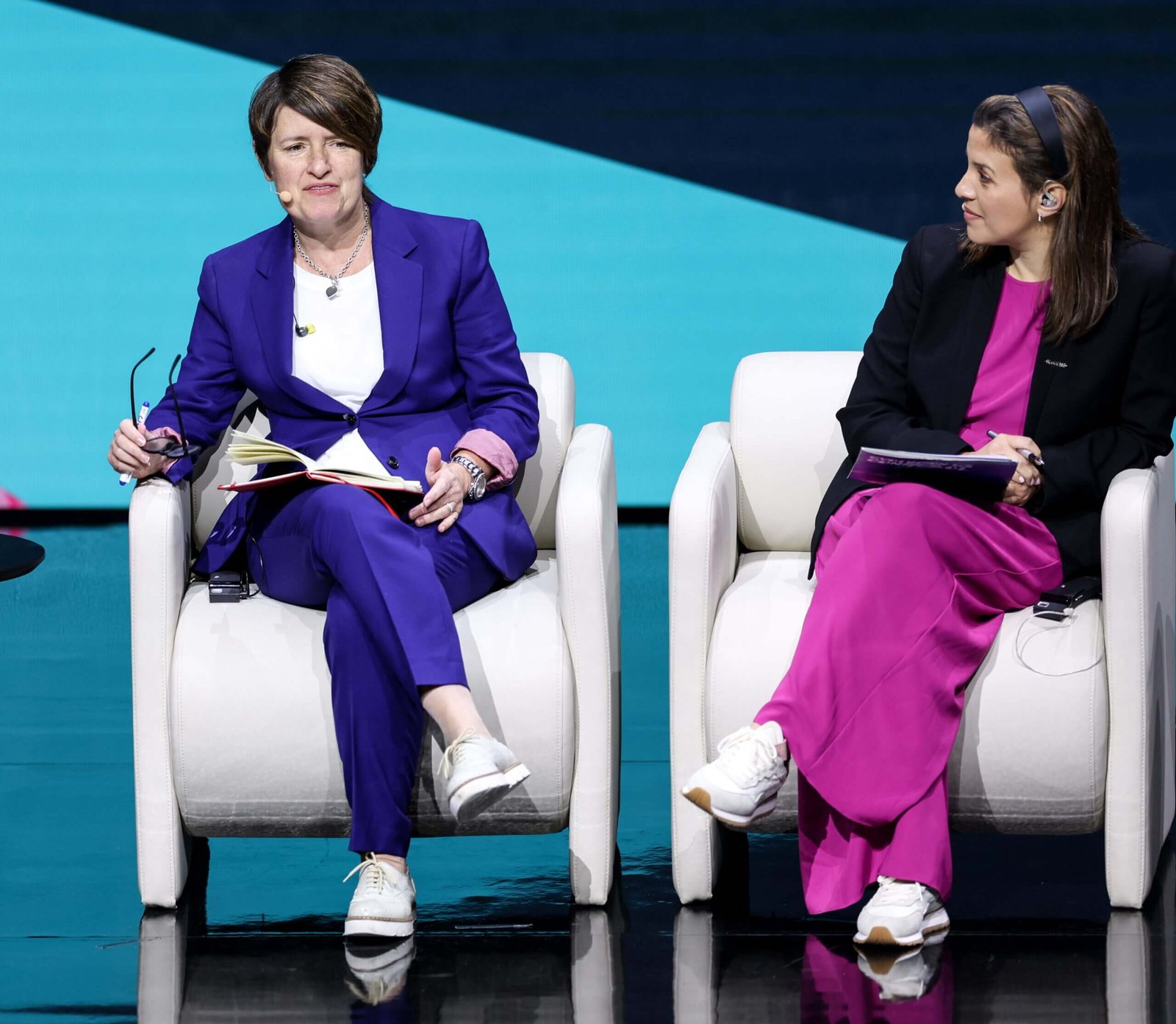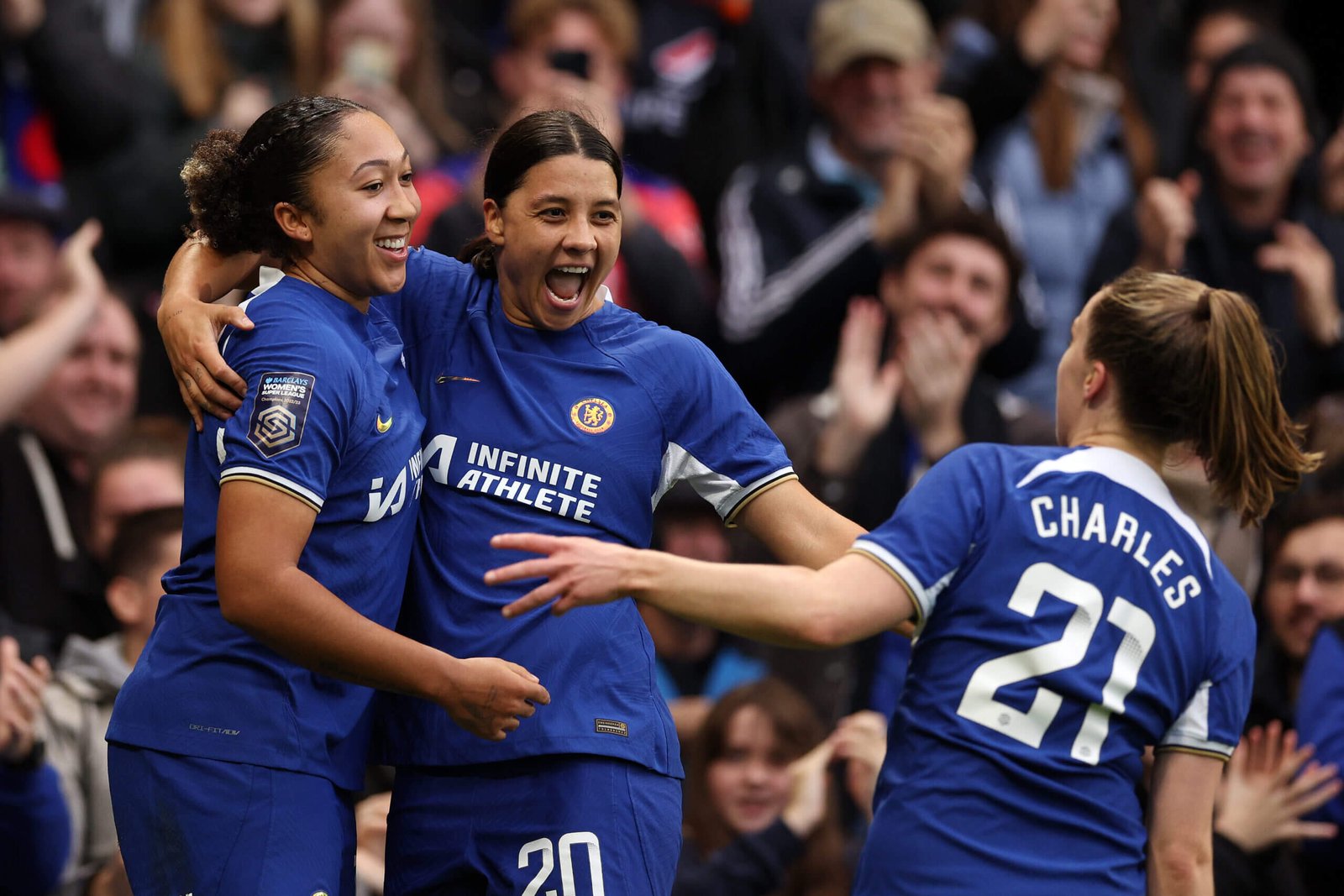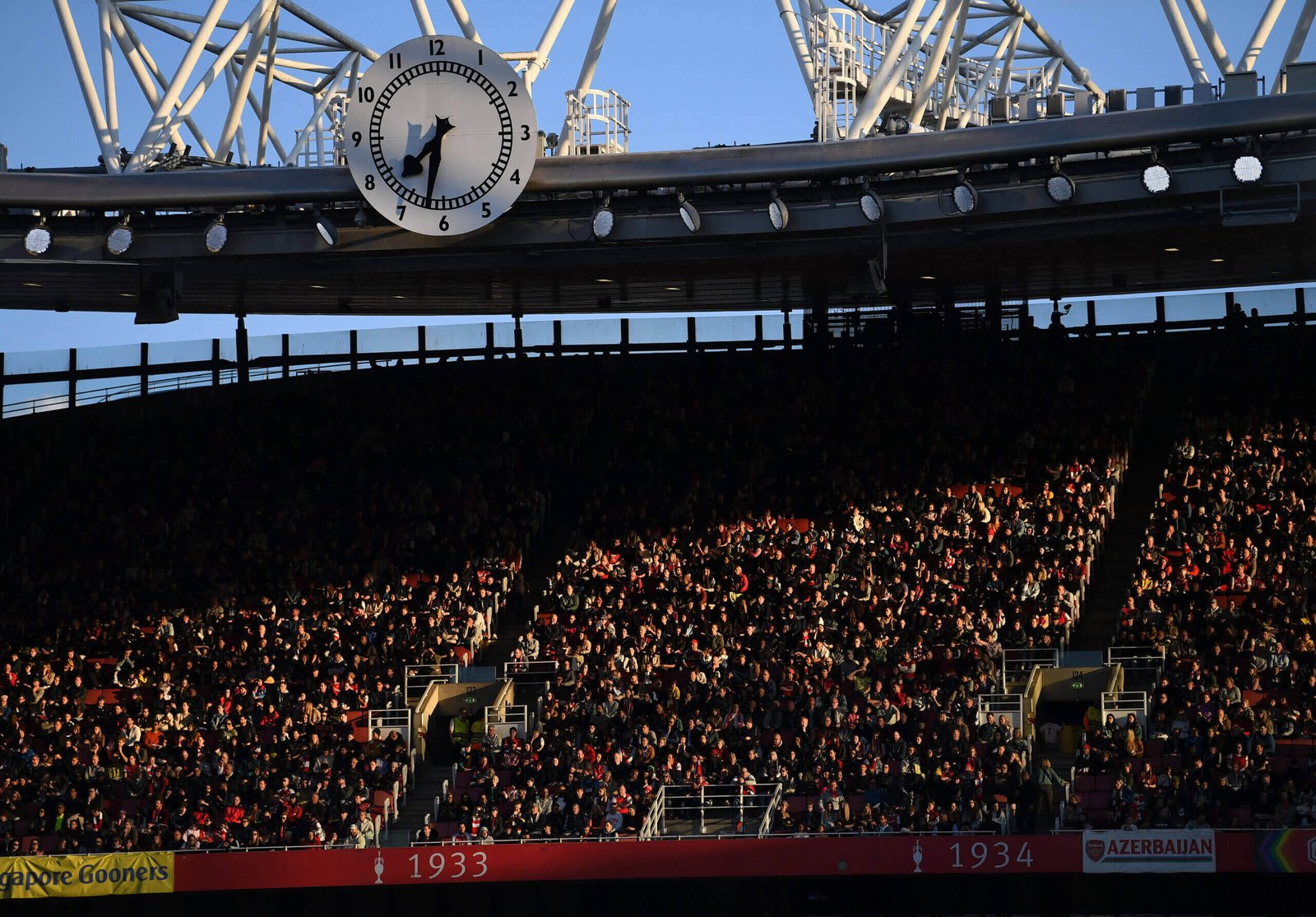Before the Women’s Super League season started, Arsenal and Everton agreed to move their match, scheduled for January 20, forward to 2pm — the idea was an earlier kick-off would give their players more time to recover before Continental Cup ties took place a few days later.
No problem, said the FA. But months later, it emerged that there was a problem.
The new kick-off time sat in the middle of the blackout period — from 2:45pm to 5:15pm on Saturdays — in which football is restricted from being broadcast in England.
The blackout originates from UEFA rules, specifically Article 48, which permits member nations to select a two-and-a-half-hour weekend slot in which live football is banned from screens. In England, the rule only emerged in 1987 when ITV struck a major television deal with the English Football League (EFL). The FA, in conjunction with broadcasters, decided Saturday afternoons should be sacrosanct.
Arsenal’s match against Everton could only be shown online after full-time (Arsenal FC/Getty Images)
By the time the issue from Arsenal and Everton’s game came to light, it was too late to make changes. Tickets had been sold and fans had booked travel, so the game went ahead, without being shown live on the FA’s official streaming site, the FA Player, as had been planned.
This issue arose in the same month that NewCo — the company set to take over the running of the WSL and Women’s Championship (WC) from the 2024-25 season — has put the WSL television rights out to tender.
It is a timely reminder of one of the 10 key recommendations made in Karen Carney’s review of women’s football, commissioned by the UK government and published last summer: that the FA, Premier League, EFL and broadcasters should work together to carve out a dedicated broadcast slot for women’s football. Last season, most WSL matches kicked off at 11.30am on Saturdays and 6.45pm on Sundays.
A regular slot is considered vital to growing the women’s game — particularly so televised games do not compete against men’s football.
“It’s about creating a habit in the audience so they know where to find it,” the BBC’s director of sport Barbara Slater said at a Department of Culture, Media and Sport (DCMS) meeting on women’s sport in November.
“If we have a WSL match up against a Premier League match, there’s a significant impact on the audience. If football can come together to create dedicated windows, that will make a difference.”
But when should that window be?
The blackout could be seen as a ready-made slot for women’s football to claim as its own.
Kelly Simmons, the former director of the women’s professional game at the FA, is among many who believe that slot should be opened up for women’s football.

Simmons (left) at the FIFA Women’s Football Convention in 2023 (Maja Hitij – FIFA via Getty Images)
“It’s written for and triggered by men’s football,” she said of Article 48 when speaking to The Athletic last year. “The women’s game should be exempt.”
That’s not quite so simple according to some.
“The legal interpretation is that Article 48 embraces the entire game, so if we disapply it for women’s football, we also have to disapply it for men’s football,” said the EFL chairman Rick Parry when at a DCMS committee alongside Premier League chief executive Richard Masters this month.
The blackout was introduced to protect attendance figures (particularly those at lower levels) and participation in grassroots games. Removing it would have “far-reaching implications”, Parry warned.
“It’s one area where the Premier League and EFL are joined at the hip. Very careful consideration is needed before Article 48 goes.”
Interestingly, in October 2022, when the EFL was negotiating a broadcast deal to replace the current one, which is ending this summer, it told potential bidders that all of its clubs’ fixtures were up for grabs, including those at 3pm, raising the possibility of Article 48 being abolished.
The speculation was ended a few months later when the EFL announced it had signed a five-year extension with Sky Sports worth £935million ($1.2bn at the time). Given Sky’s close relationship with the Premier League — which has always been firmly in favour of keeping Article 48 — any suggestion that it was under threat disappeared.
The assertion from Masters and Parry that women’s football could be free from from the blackout while also keeping Article 48 in place is an interesting one.

Masters is cautious about abolishing the blackout (Alex Livesey – Danehouse/Getty Images)
James Tobias, a lawyer specialising in sports media and commercial rights, explains that the blackout does have exceptions.
“There are certain categories that are set out in the regulation, including international games and also, quite broadly and vaguely, matches of national importance,” Tobias says.
Could the FA or the government decide women’s football matches are of “national importance” to allow them to be broadcast during the blackout?
“The problem is that if the FA decides to transmit a match by one of those exemptions, it means they must also accept the transmission of any other match in its territory during the same period,” Tobias continues.
“So if you allow women’s football to be shown during the 3pm blackout, you must allow others to be shown as well.”
But could there be ways around it?
“The most obvious one is to rewrite the UEFA regulation, but the FA can’t do it unilaterally,” says Tobias.
Only three UEFA members (England, Scotland and Montenegro) have chosen to have this blackout, so it begs the question: if England and Scotland decided they wanted to change the specifications of Article 48, would anyone complain?
“The Premier League and EFL might not be so relaxed about disrupting the status quo,” Tobias says. “UEFA is not directly answerable to them but they are unlikely to want to get stuck in the middle of a fight between the FA on one hand and the Premier League and EFL on the other, when their job is to enforce and implement rules that are in the interests of European football as a whole.”
The other possibility is for a broadcaster to challenge the ruling.
“It is commonly argued that Article 48 is against ‘competition law’ and may be unenforceable anyway,” says Tobias, who explains that if Sky or any other rights holder decided to challenge the blackout so it could broadcast women’s football in that slot, then there would be an “interesting competition-law case about whether the 3pm blackout is even permissible”.
He continues: “It has been held to be permissible previously but that requires there being objectively proportionate grounds and a public-interest objective.”
Protecting lower-league crowds and playing the game at a grassroots level is arguably in the public interest — but many believe that, in the modern day, those arguments are no longer relevant.
Simmons notes that the regulations were primarily created with the men’s game in mind, so there are grounds for issuing separate statutes for the women’s game.
“If there’s enough political and public will and pressure on UEFA — who have to listen to their stakeholders — that is an interesting angle,” says Tobias. “But you’re going to run into the same issue of the men’s game presumably contesting that and making it difficult. Are UEFA going to want to get stuck in the middle of that? Probably not.”
But why is the Premier League reluctant to allow women’s football to operate in the 3pm slot? Is there an element of protecting future options?
The latest broadcast deal signed by the Premier League is worth £6.7billion over four years. Although that headline figure represents growth on the previous deal, it is based on an increased number of games being made available for live broadcast. For the 2022-2025 rights cycle, the number of matches sold for broadcast was 200 out of a total of 380 per season. But for the next one, it is 267, meaning that the value per game has fallen.
With clubs accustomed to television income rising every few years, that 3pm slot could become a crucial bargaining chip in the Premier League’s renegotiations with broadcasters — and it is a conversation that would sound rather different if women’s football already occupied that slot.
Is 3pm on a Saturday even the best slot for women’s football? Just because it’s obvious doesn’t make the argument correct.
Many within the women’s game believe it would be a game changer in terms of broadcast value, presenting a slot that would not only build in-person attendance figures but television-viewing audiences too.
So far, the most-watched WSL game this season has been Chelsea vs Liverpool on the BBC in November, which kicked off at 1.30pm on a Saturday and had an average TV audience of 796,000 viewers, with a peak of 955,000.

Chelsea’s 5-1 win over Liverpool had almost one million viewers (Richard Heathcote/Getty Images)
“That’s no accident” said the BBC’s Slater at the DCMS meeting, referring to the fact that it was a men’s international break — meaning there we no Premier League games to compete with that weekend.
At the same meeting, ITV director of sport Niall Sloane said the 3pm slot should be looked at “because where else can women fit into a weekend? It’s quite hard to find those slots”.
Roger Domeneghetti, a senior lecturer in journalism at Northumbria University, hopes NewCo is considering this.
“I understand why people would say, ‘Let’s put it there’, because it’s the one peak slot across Friday night to Monday night where there wouldn’t be a Premier League game,” says Domeneghetti, whose book From the Back Page to the Front Room provides a history of English football media.
“But I’d also like to see if there’s been any proper research done as to whether it would be a good slot for the women’s game. When the new Premier League deal comes into force, you’d still be clashing with three men’s top-flight games and the overwhelming majority of EFL games.”
When NewCo CEO Nikki Doucet met with members of the media for the first time last week, she made it clear that learning more about the fanbase of the women’s game is a priority. With the WSL’s first two-year broadcast deal approaching its end, there will be some data available to help that process.
It’s crucial to know who the audience is, says Domeneghetti. “What are those people doing normally at 3pm on a Saturday?” he asks. “Are they people who are already watching football live? And if so, are they going to stop watching football live to watch it on TV? Or do they have other leisure pursuits that they usually follow at that time, and will they change them?”
There are also logistical issues with Saturday 3pm kick-offs. A lot of WSL and Championship clubs don’t own their stadiums. Instead, they share with men’s teams who might have games scheduled for that time. And there could be more clashes for Arsenal, Chelsea and other teams who are playing an increasing number of matches at their men’s side’s stadium. Last season, there were 131 Saturday 3pm kick-offs in the Premier League — the highest number since the 2018-19 season (148).
“I can see the perspective on 3pm (for women’s football),” said Sky Sports managing director Jonathan Licht at the DCMS meeting. “It may not be so clear-cut, though. More games happen at 3pm than at any other time, so many people are attending. It’s the time when most grounds are in use.
“I’m not saying it’s not going to work. I’m just saying let’s not necessarily put all our eggs in that basket and assume it’s going to be a great ‘unlock’.”
It’s also worth remembering that the women’s game would not be able to broadcast every match at the same time. The televised WSL games are usually played early on a Sunday — this weekend, BBC Two is showing West Ham vs Arsenal at 12.30pm on Sunday — or late, following straight on from Sky Sports’ Super Sunday. That’s the case this weekend with Chelsea vs Everton at 6.45pm.

Former England internationals Alex Scott, Anita Asante and Karen Bardsley are BBC pundits (Visionhaus/Getty Images)
The early kick-offs are felt by some to be lacking in atmosphere, and putting them on a Sunday means they clash with grassroots girls’ football games. There are issues with the evening kick-offs, too, which can be challenging in terms of travel or for parents who take young children.
Most seem to agree that women’s football needs some regularity. People need to know when and where they can find it without proactively seeking out that information every week.
“The biggest thing I’ve learned is that we’re starting to do the right insights. Fandom is in its infancy,” Doucet said last week. “Even if you’re a purist, you’re probably still a new women’s football fan. When we think about the broadcast (deal) in that context, for the fans, we have to make it as easy as possible to watch the league.
“The Karen Carney review said women’s football needs to figure out its own appointment to view. We’re exploring what that looks like and trying to figure out what the market’s willing to do. We’re looking at every possibility and trying to understand that we’re part of a whole football ecosystem.”
How Doucet navigates the competing priorities within that ecosystem will control the future of the professional women’s game in England.
(Top photo: David Price/Arsenal FC via Getty Images)
Read the full article here


